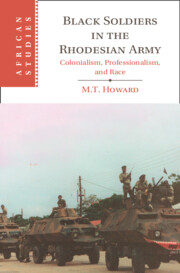Book contents
- Black Soldiers in the Rhodesian Army
- African Studies Series
- Black Soldiers in the Rhodesian Army
- Copyright page
- Dedication
- Epigraph
- Contents
- Figures
- Preface
- Acknowledgements
- 1 Introduction
- 2 The Creation of Black Rhodesian Soldiers’ Regimental Loyalties
- 3 ‘The Rhodesian Army Was the Best in Everything’
- 4 Racism and Soldierly Loyalty During the War
- 5 The Impact of the War upon Soldierly Loyalties
- 6 ‘They Just Follow the Government of the Day’
- 7 A New ‘Government of the Day’ Dawns
- Conclusion
- Bibliography
- Index
- African Studies Series
7 - A New ‘Government of the Day’ Dawns
The Loyalties of ‘Formers’ in Zimbabwe, 1980–1981
Published online by Cambridge University Press: 01 February 2024
- Black Soldiers in the Rhodesian Army
- African Studies Series
- Black Soldiers in the Rhodesian Army
- Copyright page
- Dedication
- Epigraph
- Contents
- Figures
- Preface
- Acknowledgements
- 1 Introduction
- 2 The Creation of Black Rhodesian Soldiers’ Regimental Loyalties
- 3 ‘The Rhodesian Army Was the Best in Everything’
- 4 Racism and Soldierly Loyalty During the War
- 5 The Impact of the War upon Soldierly Loyalties
- 6 ‘They Just Follow the Government of the Day’
- 7 A New ‘Government of the Day’ Dawns
- Conclusion
- Bibliography
- Index
- African Studies Series
Summary
Black Rhodesian soldiers were integrated into the new Zimbabwe National Army (ZNA) by Robert Mugabe’s ZANU government, contrary to widespread fears of persecution. This was highly unusual, as in the aftermath of many wars of decolonisation, the fate of those who had fought for the colonial army was dire. Mugabe government’s prime motive was to retain the RAR’s military capabilities, which it relied upon to control conflicts between the liberation armies in the tumultuous post-independence period. This chapter also discusses how black ex-Rhodesian troops played a decisive role in quelling inter-liberation army fighting in the Assembly Points (APs) and the ZNA battalions that were being integrated during 1980 and early 1981. My interviewees felt that, during the conflicts of 1980–1, their military performance demonstrated their loyalty to the ‘government of the day’ and their military skills, and thus cemented their place in the ZNA. Finally, this chapter discusses the nostalgic reminiscences of these veterans and how the hindsight of the post-2000 ‘crisis’ years has impacted their narratives.
Keywords
- Type
- Chapter
- Information
- Black Soldiers in the Rhodesian ArmyColonialism, Professionalism, and Race, pp. 211 - 248Publisher: Cambridge University PressPrint publication year: 2024

